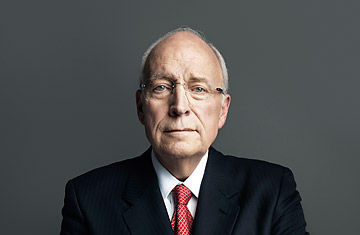
Dick Cheney's new memoir, In My Time, is not a politician's catalog of triumphs. True, Cheney searches in vain for a single regret during his eight years as Vice President. But he is no stranger to defeat. His book is suffused with awareness that he lost his President's confidence, and the public's, long ago.
The narrative is revisionist at heart, aspiring to win back a political class that turned against Cheney — on Iraq, on the "dark side" of the war on terrorism, on executive supremacy and on a "no talk" strategy of regime change in North Korea and Iran. Yet Cheney is reluctant to open the books on what he knows. In that sense his memoir becomes a war on history, rewriting the public record with lawyerly arguments that rest on truncated facts and dubious evidence.
Again and again over 527 pages, Cheney alludes to core beliefs that he does not expect his countrymen to understand. In his grim brand of realism, the world is a mortally dangerous place, power is the only currency, and hard-minded leaders must do ruthless things to protect us from perils we refuse to see. Consider Cheney's use of the four p's: popular, politics, polls and public opinion. Almost without exception, he deploys those words in derisive counterpoint to his own clarity of purpose and principle. Among his longest-standing themes in public life is the fickleness of the electorate and its uneven grasp of facts. Courage, as Cheney depicts it, means facing down voters as well as terrorists. He reserves his greatest contempt for colleagues like Colin Powell, so "attuned to public approval," and politicians across the years who had "run for the hills when things got tough."
Good form obliged Cheney to pretend while in office that he was merely an adviser. On this his book gives a more frank account. He did not see the vice presidency, as John Adams did, as "the most insignificant office that ever the invention of man contrived." After decades as a lieutenant — chief of staff to Gerald Ford, minority whip under House GOP leader Robert Michel, Secretary of Defense for George H.W. Bush — he found himself "elected and sworn in as a constitutional officer." Cheney declared independence as "the only one the president couldn't fire."
Which is pretty much how he operated. The story of his complex partnership with George W. Bush begins with a blunt admission that Cheney misled even Bush's inner circle, as he ran the search for a running mate in 2000, with "a list for public consumption." He kept "the real list" to himself, maintaining intimate dossiers in his daughter Liz's basement. Nearly three weeks after he and Bush had agreed privately to be running mates, Bush's closest aides — including Karen Hughes and Joseph Allbaugh — were still in the dark. Even now, Cheney stands by the official campaign spin that Dr. Denton Cooley, a renowned heart surgeon, gave him "a green light on the health front." In Angler, my book on Cheney, Cooley said he never examined the man or reviewed his charts.
Cheney matter-of-factly disregarded the Bush team's request for "a kinder, gentler Dick Cheney" at the 2000 Republican Convention. Bush was pitching "a moderate face to undecided voters," but "I ignored their advice." As the Florida recount began, Cheney grabbed a pen and began sketching a Cabinet on the back of an old press release. He filled the list with old allies, cutting out the fellow governors whom Bush had promised to recruit. Next comes a marvelous scene of Cheney in his kitchen, running the transition with an old Princess phone for fear of eavesdroppers on the household's cordless line.
Readers will quickly sense that on many issues, the Bush White House had two executives, not one. Cheney says, in a rare expression of pride, that he negotiated "a unique arrangement in our history." After the disputed election, Bush spoke of reaching across the aisle. The same day, Cheney met privately with Senate moderates and crushed their hope that "we would be trimming our sails, moving to the center, and looking for areas of compromise."
